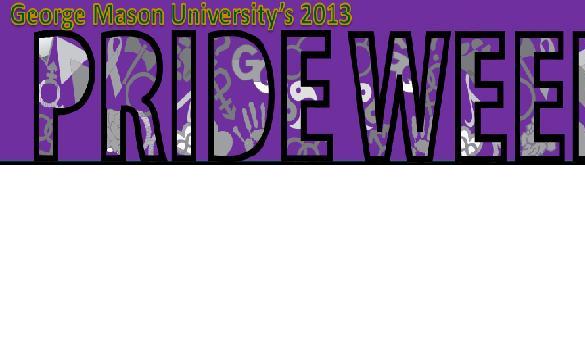Pride Week event highlights overlooked LGBTQ African-American authors
The stories of black gay and lesbian writers are often erased from history. Even when homosexual, black authors have been included in history, like Langston Hughes, their sexuality is often erased from their narrative. American students often learn about Hughes’ poems such as “A Dream Deferred,” but rarely do they hear about his poem “Café 3am” which describes police brutality against the gay community.
As part of Mason’s annual Pride Week, Dr. Keith Clark, a professor in George Mason University’s English department, and Amena Johnson, program coordinator for LGBTQ resources, facilitated a discussion centered on black LGBTQ authors and the erasure of black LGBTQ icons.
“Amena and I wanted to make sure that we focused on intersectionality,” said Dr. Clark at the onset of their event.
Intersectionality refers to the multiple identities that define and, at times, oppress minority groups of people such as race, gender, sexual orientation, and class.
Dr. Clark presented on black LGBTQ icons such as James Baldwin, Bayard Rustin, Lorraine Hansberry, and Audre Lorde.
“People like Baldwin and Bayard Rustin [the civil rights activist] often get exiled from the [Civil Rights] movement because of their sexual orientation,” Dr. Clark explained.
Often black LGBTQ identifiers face criticisms for not neatly fitting into stereotypes of blackness or gayness. As Dr. Clark said, “Baldwin is a strange icon because he is not black enough and not gay enough.”
In his discussion of Baldwin, Clark notedthat the FBI, under the leadership of J. Edgar Hoover, referred to Baldwin as a pervert because of his sexuality. Eldridge Cleaver, a prominent member of the Black Panther Party, also bitterly attacked Baldwin’s sexuality in his memoir “Soul On Ice.”
 |
| Author James Baldwin on the cover of Time Magazine in 1963 (photo couresty of Time.com). |
Black LGBTQ women have also received similar criticisms such as the ones faced by James Baldwin. When Alice Walker’s novel “The Color Purple” was adapted into film, black conservative Tony Brown assailed Walker for the sexual relationship between Celie and Shug, two black female characters in the novel. Brown referred to the film as, "the most racist depiction of Black men since ‘The Birth of a Nation’ and the most anti-Black family film of the modern film era," on his television show “Tony Brown’s Journal.”
However, attacks on homosexual representation are all too often common.
“Black authenticity does not include black sexual differences,” Clark said when he explained critics’ reaction to the romantic relationship between Celie and Shug.
Clark shared a memory from when he went to see “The Color Purple” in a movie theater. He said people were disgusted by Celie and Shug’s kiss. It is only a small reflection of a larger societal issue in the acceptance of black LGBTQ members.
Famed playwright Lorraine Hansberry is another example of someone who, according to Clark, had her sexuality “straight-washed” by America’s history books.
 |
| Playwright and author Lorraine Hansberry identified herself as a lesbian, a fact that is rarly discussed when focusing on her body of work (photo courtesty of biogoraphy.com). |
Similar to Langston Hughes, many people are unaware that Hansberry was a lesbian because that part of her identity is often left out. Rarely do students who read “A Raisin in the Sun,” ever study Hansberry’s letter “The Ladder.” In her letter, Hansberry advocates against the oppression of the gay community where she continued the tradition of black women writers challenging sexism and patriarchy within black communities. Yet, this portion of her life is often overlooked.
After Clark finished his presentation, Johnson continued with a discussion about the role of present day black LGBTQ writers.
“Who are our Langston Hughes and Zora Neale Hurstons?” Johnson asked attendees.
Some answers included Frank Ocean’s groundbreaking letter, in which he wrote about his love for another black man. Although Ocean’s letter might lead to a more open definition of black masculinity, members of the audience did not want to label Ocean as a gay black man because he did not embrace the label himself.
Representations of black LGBTQ members were another focus of conversation in reference to the show “Noah’s Arc.” The show, which aired from October 2005 to October 2006, examined the lives of black gay men.
However, “Noah’s Arc” had its own imperfections.
“I consider myself a black lesbian and I don’t see myself anywhere in the media,” said Johnson. Johnson then asked the audience what they could do at Mason to help improve visibility of the black LGBTQ community.
In response to Johnson’s question, Clark explained that black LGBTQ members suffer “different forms of erasure and amputation.” If students at Mason wanted to see more representations of black LGBTQ members, “You have to articulate what you want.” Clark said.
As the event ended, Johnson gave one last piece of advice about the role of black LGBTQ members. “This is an everyday conversation.” It should not be one isolated to just Pride Week. Instead, it’s a conversation that must happen regularly.

